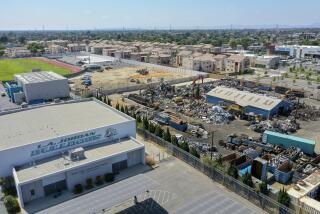Teledyne Faces New Charges Over Exports of Zirconium : Defense: A federal grand jury accuses the company of filing false papers on the ingredient used in making bombs.
- Share via
Teledyne Inc., already facing criminal charges of illegally exporting zirconium used to make cluster bombs for Iraq, was indicted again Wednesday on new charges of conspiring to ship 154 tons of the material to Jordan in the late 1980s, the Justice Department announced.
A federal grand jury in Washington charged the Los Angeles-based defense contractor and three foreign firms with filing a false export application for the zirconium, saying it would be used by a Greek firm to make containers for chemicals.
In fact, the four-count indictment alleges, Teledyne knew the material--which increases the power of explosives--would not be used for those purposes. The indictment claims that after the cargo left U.S. ports, it was diverted to Aqaba, Jordan, in June, 1988, in violation of U.S. munitions regulations.
If convicted of the charges, Teledyne and the other corporations face more than $20 million in total fines and possible suspension of future exports, the Justice Department said.
Teledyne, whose Wah Chang division in Albany, Ore., sold the zirconium pellets, promptly called the allegations “unwarranted” and said the company would “vigorously defend itself against the charges.”
The required export licenses were obtained from the U.S. government, and the company had official assurances from the Greek government that the zirconium would not be improperly diverted, according to William J. Linklater, a lawyer for Teledyne. He also disputed the allegation that Teledyne knew its export application was false.
Regardless, the grand jury’s action further opens the door for a public airing of how Teledyne and other companies and individuals allegedly provided bomb parts that ultimately went to the Middle East in the years leading up to the Persian Gulf War in 1992.
Teledyne is already facing charges, leveled by a federal grand jury in Miami a year ago, that the company illegally shipped 130 tons of zirconium to Chilean arms merchant Carlos Cardoen between 1983 and 1988. Cardoen used the zirconium to produce 24,000 cluster bombs for Iraq, according to that indictment.
The indictment Wednesday does not specify where the zirconium that was ostensibly bound for Greece ultimately went after it arrived in Jordan. However, Assistant U.S. Atty. Eric Dubelier told Associated Press that the cargo “probably did go to Iraq.”
In the Miami case, Teledyne had contended that U.S. government officials knew the zirconium would be used to make bombs but that they approved the sale nonetheless as part of a secret plan to help Iraq in its eight-year war with Iran.
But in May, a federal judge ruled that Teledyne could not use as a defense its assertion that the U.S. government quietly approved of the exports.
The latest indictment also marks the fourth time Teledyne has been charged with federal felonies since the late 1980s, giving it one of the worst ethics records in the U.S. defense industry. The company has also faced half a dozen civil fraud suits.
Indeed, the latest charges mar Teledyne’s recent attempts to emerge from its years of litigation. In April, Teledyne settled two major civil suits brought by the Justice Department and four whistle-blowers for more than $112 million. The charges included padding contracts and improperly testing electronic components.
The indictment in Washington also names as defendants a Greek container firm, a German export concern and a Belgian company, along with a Teledyne Wah Chang salesman, Edward Johnson, and a member of the Belgian firm.
Johnson, 54, could not be reached for comment. Linklater, the attorney, said Johnson is on a leave of absence to recover from recent surgery.
More to Read
Inside the business of entertainment
The Wide Shot brings you news, analysis and insights on everything from streaming wars to production — and what it all means for the future.
You may occasionally receive promotional content from the Los Angeles Times.












